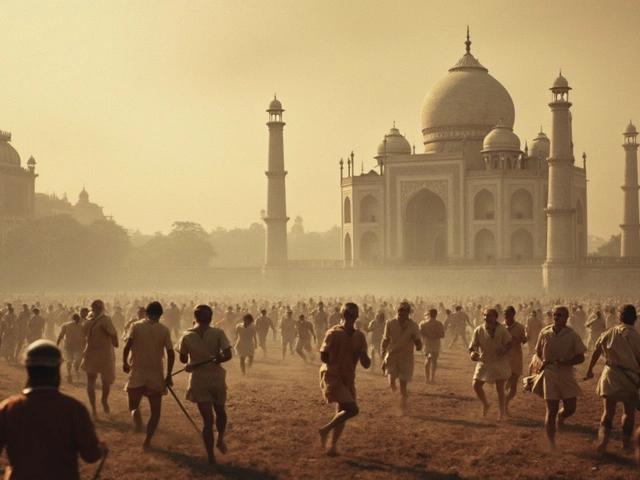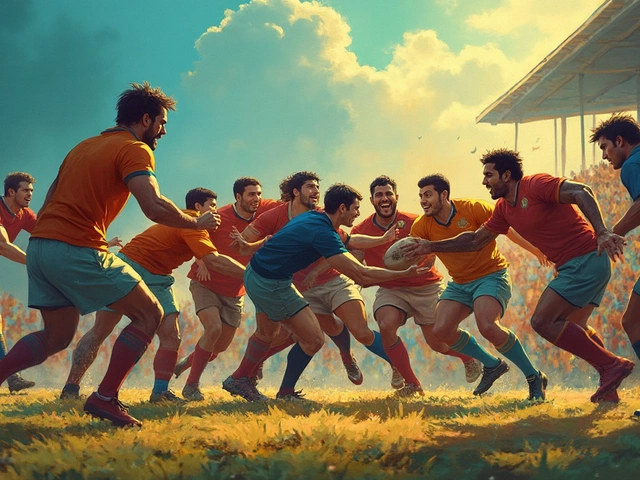Rugby is not just a sport; it's an experience that brings people together, igniting excitement and passion around the globe. For over a century, this sport has captivated hearts with its unique blend of strategy, strength, and camaraderie. Yet, in our swiftly changing world, one might wonder if rugby still has the same impact as it once did.
As we delve into this topic, let's explore how rugby has evolved. We will also consider the expanding international fan base, and how modern technology and broadcasting have kept spectators hooked. These elements, along with the shifting landscape of rugby fixtures, ensure that this sport remains firmly rooted in our cultural panorama. Let's dive into this discussion to see why rugby is still very much alive and kicking.
- The Evolution of Rugby
- Global Expansion and Influence
- Modern Broadcasting Techniques
- The Future Landscape of Rugby
The Evolution of Rugby
The world of rugby has witnessed remarkable transformations since its early days, evolving from a quaint pastime to a prominent international sport. Its origins trace back to the early 19th century in England, when folklore suggests that a young William Webb Ellis disregarded the rules of football by picking up the ball and running with it during a match at Rugby School. This rebellious act set in motion a series of codifications that would eventually shape the modern game of rugby. By 1871, the Rugby Football Union (RFU) was established to provide structure and formal regulations, mirroring the way cricket had previously standardized its rules. Over time, rugby split into rugby union and rugby league due to disputes over professionalism in the late 1800s. This division led to each variant putting its unique spin on the gameplay, rules, and global appeal. Despite regional loyalties, the passion for the game ignited a worldwide following, which continues to grow.
Rugby's expansion beyond England was helped greatly by the British Empire, as soldiers, sailors, and settlers introduced the game to distant shores. As a testament to its enduring legacy, the game has found robust fan bases in places as diverse as New Zealand, South Africa, and Argentina. During this journey, the game mirrored societal changes, such as the increasing roles of women on the field and the breaking down of racial barriers in places like South Africa, post-apartheid. Today, rugby embraces inclusivity in a manner reflective of its continuous evolution. As Neil Back, a former England rugby player, once said,
“Rugby is a hooligan’s game played by gentlemen, constantly adapting yet never losing its soul.”This spirit of adaptation is evident in the modern rule changes designed to enhance safety, speed, and entertainment value for fans and players alike.
Recent decades have seen rugby flourish into a global phenomenon, often highlighted by events like the Rugby World Cup, first held in 1987. This tournament, contested every four years, has become one of the sport's pinnacles, showcasing the world's talented teams and players to millions of fans worldwide. The introduction of professional rugby in 1995 marked another significant milestone, transforming it into a lucrative career for players who previously balanced sport with other vocations. Advances in sports science and training regimes have elevated the quality of play, making matches more engaging and competitive, aptly reflecting the modern spectacle that rugby has become today. As rugby continues to grow, the fixture list expands, delighting fans with a rich calendar of international tests and domestic leagues, each contributing their own unique stories to the rich tapestry of rugby history.

Global Expansion and Influence
Rugby has come leaps and bounds from its origins in England to become a sport with a global footprint. Once mainly confined to the British Isles, this exhilarating game now finds fans and dedicated players in regions far-flung from its birthplace. While traditional powerhouses like New Zealand, South Africa, and Australia have long celebrated rugby, recent years have seen a surge in enthusiasm in nations like Japan, the United States, and Argentina. This growth is not coincidental; rather, it arises from strategic governance by World Rugby and an organic rise in local interest. As nations embrace rugby, they contribute to its evolving narrative, bringing their unique flair and fervor that enrich the sport globally.
Consider Japan, whose remarkable hosting of the 2019 Rugby World Cup showcased not only their capability but also their cultural passion for rugby. That event remains etched in memory as the most-watched Rugby World Cup ever, drawing in a staggering 857 million viewers worldwide. Such exposure is invaluable, enticing new audiences and sparking countless budding players' imaginations. In the United States, rugby's growth has been particularly noteworthy. The establishment of Major League Rugby (MLR) in 2017 gave the sport a professional footing stateside, leading to a steady increase in spectators and participants alike. This burgeoning interest is coupled with rugby's inclusion in the Olympics, which has rekindled its image on a prestigious sporting platform. Such developments are cascading beyond mere play; they are creating economic investments, fostering diplomatic exchanges, and even influencing societal attitudes towards sportsmanship and teamwork.
In regions where rugby was relatively unknown, grassroots initiatives and education programs have been instrumental in raising the sport's profile. Nations like Brazil and Kenya have implemented rugby programs in schools, leveraging the sport as a tool for youth development. Reports indicate that Brazil's school-based rugby programs have resulted in nearly a 20% increase in local clubs, a testament to rugby's potential as a social catalyst. These efforts are compounded by increasing broadcast accessibility, where platforms have brought international fixtures into living rooms around the globe. Renowned institutions have commented on this expansion, with Sport England once noting,
"The current wave of global expansion is unprecedented, showcasing rugby's growth and its power to bridge cultural divides."Such success on a global scale demonstrates rugby's adaptability and universal appeal, factors that anchor its significance worldwide.
Today's rugby is undeniably influenced by broader economic forces, with sponsors and corporations recognizing its global reach. Brands that align with rugby benefit from its values of integrity, discipline, and inclusivity. Moreover, the sport's adaptability has fostered unique regional styles and techniques that contribute to a more dynamic form of play. Nations instrumental in this change periodically gather to share insights and craft strategies, as seen in annual international conferences organized by World Rugby. These events not only facilitate knowledge exchange but also align the sport's expansion with regional interests. By investing in emerging markets and supporting local infrastructures, World Rugby ensures that the game flourishes at all levels, from grassroots initiatives to top-tier competitions. This ongoing relationship between global expansion and influence ensures that rugby is not merely surviving but thriving as a beloved sport that resonates across cultures.

Modern Broadcasting Techniques
The world of rugby has seen a revolution in how it's broadcast, thanks to technological advances. Once reliant on traditional television, the game's reach has now been amplified through a variety of digital channels. These modern broadcasting techniques are not just about reaching larger audiences, but about delivering an immersive experience that captures the passion and intensity of the matches. Viewers around the globe can now experience live games with clarity and precision that was unimaginable just a few years ago.
The introduction of high-definition and now ultra high-definition broadcasts has allowed fans to experience the game in crystal clear quality. These broadcasts are supported by multi-angle cameras and aerial drones that provide a comprehensive view of every thrilling moment. Whether it's a deep dive into the scrums or a close-up of a try, fans can enjoy the sport with the same excitement as if they were in the stadium. Besides, the slow-motion replays add a dramatic flair that’s perfect for analysis and savoring key moments.
Social media platforms play a critical role in the modern broadcasting landscape for sports like rugby. They provide real-time updates and engage fans across the globe, creating a community that thrives on accessibility and interaction. These platforms offer highlights, behind-the-scenes footage, and engaging commentary which helps in keeping the sport vibrant and accessible to all age groups. According to a study by Deloitte, digital and social media engagement accounts for a 20% increase in viewership among the younger audience.
Leveraging Technology
Many rugby organizations have also embraced Augmented Reality (AR) and Virtual Reality (VR), making it possible for fans to enjoy the game in ways never before possible. With VR headsets, fans can feel like they're sitting at the pitch-side, while AR applications bring interactive elements to live streaming, enabling fans to access detailed player statistics and live commentary as they watch. This fusion of technology with traditional broadcasting makes for a richer, multi-faceted viewing experience.The analytics behind these broadcasts further enrich the viewer's experience by providing insights that elevate understanding of the game. Cutting-edge graphics and data integration make it possible to see patterns and strategy in play, which not only informs the serious fan but also makes the sport more accessible to newcomers. An ESPN report suggests that such advanced tech usage helps increase audience retention by over 15%, as it adds depth to the viewing experience.
"The future of rugby broadcasting will be interactive, and it will tailor the experience to each fan," said John Smith, a leading figure in sports broadcasting. "This personal interaction keeps viewers coming back, becoming not just fans, but advocates for the sport."
These modern broadcasting techniques have been a game-changer for rugby, helping the sport break into new markets and maintain its longstanding fans. As technology continues to evolve, so too will the ways we consume and experience rugby. It's a captivating time for the sport, providing unprecedented opportunities for deeper engagement and appreciation.

The Future Landscape of Rugby
As rugby strides into the future, its landscape is a blend of tradition and innovation, ensuring this rugby remains a cherished sport worldwide. The game's rich history provides a sturdy foundation, but it's the new dimensions being added that catch the eye. Increased emphasis on safety protocols has led to the introduction of advanced technologies like headgear equipped with impact sensors. These innovations keep the players safe while preserving the dynamic and strategic essence that rugby is known for. On the professional level, strategies are evolving rapidly, with teams now using data analytics for better performance and strategizing in crucial matches.
Equally impactful has been the growth of rugby's global footprint. Nations in Asia and the Americas are bolstering their rugby programs, which is expanding the sport beyond its traditional strongholds. This worldwide enthusiasm is accompanied by rugby fixtures that are more inclusive and diverse, encompassing both men's and women's games. Tournaments are not just about the competition; they're festivals of culture, where the sport intertwines with community and global camaraderie. Rugby's universal appeal is expected to surge, especially with the widespread broadcast capabilities offered by the internet, making games accessible to fans no matter where they reside.
The Role of Technology and Media
Technology and media are undeniably shaping the future of rugby. The way matches are presented and shared has transformed, allowing an immersive experience both from inside the stadiums and through screens. AI and AR are being explored to enhance how we enjoy the sport, offering fans interactive experiences that bring them closer to the action. This level of engagement is vital as younger audiences are more tech-savvy and expect digital interaction as part of their sporting experience. As far as traditional broadcasting is concerned, partnerships with streaming giants are likely to continue, providing rugby an avenue to reach millions more viewers on platforms outside of conventional sports channels.
The renowned rugby commentator, Jim Maxwell, once remarked, "Rugby is no longer just a game, it's a digital experience that resonates with people across continents."
The rising popularity of esports has also influenced traditional sports, and rugby is no exception. Virtual rugby leagues are emerging, drawing interest from both esport aficionados and traditional rugby fans alike. The digital representation of the sport invites new audiences by blending competitiveness with technological finesse, effectively setting the stage for a new era in sports entertainment.
Lastly, sustainability concerns are becoming integral to sports, and rugby is not shying away from the responsibility. Rugby unions globally are committing to eco-friendly practices, perhaps organizing matches with minimal carbon footprints and encouraging fans to contribute similarly. This commitment to sustainability not only preserves the history of the sport but also ensures it remains a feasible and responsible endeavor for future generations. Through these collective efforts, the future of rugby is promising, holding its legacy while embracing new possibilities with open arms.





